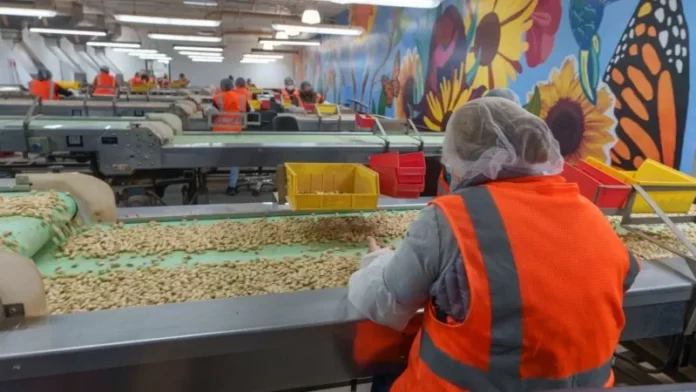In the heart of California’s farmland lies a hidden gem – Lost Hills. This small town, located in the San Joaquin Valley, is home to a bustling pistachio industry that has been growing rapidly over the past few years. Millions of shells rush down a metallic chute and onto a conveyor belt at the sprawling plant, where they are inspected, roasted, packaged, and shipped off to grocery stores around the world.
Pistachios have become a favored crop in California due to their hardiness and ability to thrive in drought-prone climates. With nearly $3 billion in revenue generated last year alone, the United States has now surpassed Iran as the world’s top exporter of this delicious nut.
According to Zachary Fraser, president and chief executive of American Pistachio Growers, this growth can be attributed to the foresight of farmers who have been steadily increasing pistachio plantings for the past 40 years. “There has been an explosion over the last 10 or 15 years of plantings, and those trees are finally coming to fruition,” he says.
California is known for its abundance of fresh produce, with more than a third of the country’s vegetables and three-quarters of its fruit and nuts grown in the state. But in the past decade, pistachios have skyrocketed in popularity, becoming California’s sixth-biggest agricultural commodity in value. They have surpassed traditional crops such as strawberries and tomatoes, according to state agricultural statistics.
While China remains the top importer of California’s pistachios, the demand for this nut has also been increasing within the United States. Once a rare sight in grocery stores, pistachios can now be found as a popular snack food in a variety of flavors, both in and out of their shells.
Leading the pack in the world of pistachios is The Wonderful Co., a $6 billion agricultural company known for their top-selling brands such as Halo mandarins and FIJI Water. The company has been growing pistachios since the 1980s, but it wasn’t until 2015 when they developed a new rootstock that yields up to 40% more nuts with the same resources. This has allowed Wonderful to grow between 15% and 20% of the U.S. pistachio crop, making them the biggest name in the industry.
Their orchards, located in the dust-filled farmland northwest of Los Angeles, stretch across vast tracts of land also lined with pomegranate trees and dairies. The pistachio trees are shaken each fall and the nuts are then hauled to a massive processing facility, where they are carefully prepared for sale.
Rob Yraceburu, president of Wonderful Orchards, says that there is a growing demand for pistachios across the world. “The world wants more,” he says, and as California’s top pistachio producer, Wonderful is determined to meet this demand.
Not only are pistachios in high demand, but they are also a more sustainable option for California farmers during droughts. Unlike other popular crops such as almonds, pistachios can sustain with minimal water and rely on wind instead of bees for pollination. The trees can also produce nuts for decades longer, making them a more profitable investment in the long run.
In recent years, many California farmers have started to shift towards perennial crops that yield higher returns than traditional annual crops like cotton. According to a 2023 report by the Public Policy Institute of California, pistachios have played a significant role in this shift. Brad Franklin, a research fellow at the institute’s Water Policy Center, says that while perennial crops can be challenging during severe droughts, pistachios have an advantage over other crops due to their ability to grow in saline soils and go longer without water. This makes them an appealing option for farmers facing limits on groundwater usage under a state law aimed at conserving this critical resource.
We are currently seeing the effects of this law on California’s agriculture, with some farmers pulling out almond orchards due to rising input costs and a glut of post-pandemic supply. But pistachio growers are hopeful to avoid a similar fate by keeping demand for their nuts ahead of supply. For example, American Pistachio Growers has recently signed an endorsement deal with a top cricket player in India in hopes of promoting pistachios in this market.
As the demand for pistachios continues to grow, the acreage of

